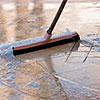
Home Maintenance; Anti-Slip Floor Safety Check
One of the most common accidents in the home is slips and falls. Most of these accidents occur because floor surfaces do not have adequate slip resistance when wet.
Driveways, footpaths, swimming pool surrounds, verandahs, and entryways are all subjected to the rain and dew which can make them dangerously slippery.
Indoor areas such as foyers, kitchens, bathrooms, and laundries can also become dangerous when water is tracked, spilled, or splashed onto floors.
Grip Guard anti-slip floor safety treatment has been formulated to make floors safer to walk on – especially when wet! The anti-slip process increases the slip resistance of floors without changing their appearance.
Floors are safer to walk on immediately after treatment and there is nothing left – other than a more slip resistant floor! This is because Grip Guard anti-slip treatment is not a coating; the process actually microscopically modifies the internal pore structure of the floor to increase slip resistance.
The elderly, because of their reduced strength and mobility, are an increased risk of slip and fall injuries. And, when they do fall, their risk of injury is high and the resulting health issues a serious risk to their continuing health.
Children are also at greater risk of slip and fall injuries because of their increased activity levels. It’s impossible to stop children from running around the house but Grip Guard anti-slip floor treatment can increase the slip resistance of floors making a slip and fall injury less likely.
Grip Guard operators provide obligation free floor safety assessments to help homeowners determine the safety of their floors. Using an ASM slip meter, operators measure the coefficient of friction of floors and, if necessary, recommend the appropriate anti-slip treatment.
Floor safety assessments are available in all capital cities including Sydney, Melbourne, Darwin, Perth, Adelaide and Brisbane as well as selected regional areas.
